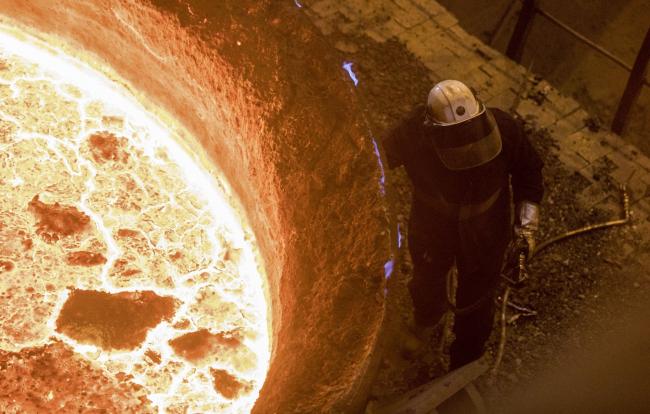(Bloomberg) -- China’s steelmakers face their biggest crisis in years, with demand frozen as factories and construction sites fall silent. But they’re still churning out metal.
The collapse in economic activity amid China’s unprecedented measures to contain the coronavirus outbreak means there are few buyers of steel, which has sent prices tumbling and put margins under intense pressure. However it’s difficult for most steelmakers in China to cut output drastically because blast furnaces are designed to run constantly, and reducing production to zero is usually a last resort. The result is millions of tons of steel piling up at mills.
“Inventories are at critically high levels,” said Kevin Bai, an analyst at CRU Group. “Most mills are still trying to keep running for now though for technical reasons.”
In China, a small number of steelmakers use electric arc furnaces, or EAFs, that remelt piles of scrap from old cars or torn-down buildings and turn it into fresh steel products. Those can be shut down quickly. The rest of the industry employs blast furnaces, huge and temperamental machines fed round-the-clock with iron ore, coking coal and other ingredients. Shutting those completely is an expensive and complex last resort.
“As far as we know, they’re all still making steel,” Elizabeth Gaines, chief executive of Fortescue Metals Group Ltd. said on a call with reporters on Wednesday, referring to the blast-furnace producers that buy her company’s iron ore. EAF mills have largely stopped production already, according to consultancies CRU Group and Kallanish Commodities Ltd.
China is the world’s largest steelmaker and accounts for more than half of global output. The virus crisis has crippled the industry’s supply chains, with the migrant workers that typically staff construction sites or drive trucks unable to return to work due to quarantine measures and movement restrictions. Spot prices for steel rebar have tumbled to the lowest since 2017, while inventories surged to the highest in almost two years as mills struggle to dispatch finished products amid transport problems.
Smelting rates in an ultra-hot furnace can be adjusted downwards but only to certain levels. The next and more complicated option is temporary hot-idling, which means keeping the furnace stoked and pausing steelmaking. An outright shutdown -- letting it go cold -- normally only happens for a complete overhaul after many years of operation, or for permanent closure.
The challenge for blast-furnace managers is how quickly the economy, which was likely running at just 40% to 50% capacity last week, can return to normal. Utilization rates for blast furnaces in Tangshan have fallen to about 74% from a peak of almost 81% last year, according to data from Beijing Custeel E-Commerce Co.
The last major round of market-driven closures was in late 2015 and 2016 when a demand slowdown in China triggered a global crisis of oversupply. The current situation has already seen an increase in steel offered for export, according to CRU Group.
Many market watchers expect China to roll out stimulus to help bolster economic growth, buoying commodity demand. Fortescue highlighted past measures have included investment in steel-intensive projects. BHP has said if the virus impacts are contained by the end of March, consumers of materials such as steel and copper should fully recover from the second quarter -- and potentially operate at higher than usual rates -- meaning that overall demand in 2020 will be unaffected.
“Obviously actual physical demand is pretty bad right now and we expect it to be bad in the short term,” Tomas Gutierrez, analyst at Kallanish Commodities, said by phone. But a lot of that demand may be delayed rather than destroyed, and there is this expectation that the government will take steps that will aid the economy’s recovery, he said.
To contact Bloomberg News staff for this story: Krystal Chia in Singapore at kchia48@bloomberg.net;Martin Ritchie in Shanghai at mritchie14@bloomberg.net;Annie Lee in Hong Kong at olee42@bloomberg.net
To contact the editors responsible for this story: Phoebe Sedgman at psedgman2@bloomberg.net, Jake Lloyd-Smith
©2020 Bloomberg L.P.
